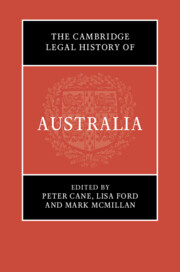Book contents
- The Cambridge Legal History of Australia
- The Cambridge Legal History of Australia
- Copyright page
- Contents
- Figures
- Maps
- Contributors
- Maps
- 1 Editors’ Introduction
- I Cultures of Law
- II Public Authority
- III Public Authorities in Encounter
- 10 The Challenge of Indigenous Polities
- 11 Australia as Empire
- 12 Australia and the World
- IV Land and Environment
- V Social Organisation
- VI Social Ordering
- VII Reckonings
- Index
10 - The Challenge of Indigenous Polities
from III - Public Authorities in Encounter
Published online by Cambridge University Press: 04 August 2022
- The Cambridge Legal History of Australia
- The Cambridge Legal History of Australia
- Copyright page
- Contents
- Figures
- Maps
- Contributors
- Maps
- 1 Editors’ Introduction
- I Cultures of Law
- II Public Authority
- III Public Authorities in Encounter
- 10 The Challenge of Indigenous Polities
- 11 Australia as Empire
- 12 Australia and the World
- IV Land and Environment
- V Social Organisation
- VI Social Ordering
- VII Reckonings
- Index
Summary
In this chapter we look at the ways in which the Australian settler-colonial constitutional order has recognised, and denied, the status of Aboriginal and Torres Strait Islander peoples as polities.We aim to show that in settler law traditional owner communities, alone or in aggregation, are largely characterised as racial groups, not as bodies politic. We trace developments in the recognition of traditional ownership, and (in glimpses) of traditional law and custom, in Australian law since the 1960s. The story is largely one of settler resistance to Indigenous legal and political authority, in the face of sustained intergenerational Indigenous advocacy. We point in particular to the fact that because they are mischaracterised as racial communities, the efforts of Aboriginal and Torres Strait Islander People to self-determine are made vulnerable to claims that their distinctive rights and institutions discriminate against non-Indigenous Australians.
Keywords
- Type
- Chapter
- Information
- The Cambridge Legal History of Australia , pp. 227 - 257Publisher: Cambridge University PressPrint publication year: 2022

